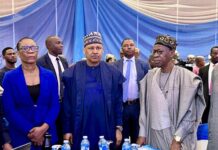
Protocols:
It is my utmost pleasure and honour to welcome you all to this important meeting of the Health Partners Coordinating Committee (HPCC). This meeting which is supposed to happen in May is delayed due to the COVID-19 pandemic activities for which coincidently, the first case in the country was reported on the day we had the last HPCC meeting on 27th February, 2020.
- Let me use this opportunity to thank you once more for your support in the COVID-19 response, having earlier extended my appreciation to you during the DPG-H COVID-19 response weekly meeting for your efforts, commitment and huge support in the fight against this pandemic in the Country.
- I am pleased to inform you that the Ministry and its Agencies have developed an Integrated National Health Sector COVID-19 Response Plan derived from Pillar 4, Priority Area 1 of the NSHDP II. The plan will ensuredefines responsibilities and harmonization of efforts across the Federal and States and non-interruption of non-COVID 19 routine health services. Maintaining strong collaboration with donors/partners and private sector will ensure alignment and achieving a balanced allocation of funds for financial sustainability.
- As you are all aware Nigeria has shown commitments towards improving its health sector outputs and outcomes and achieving Universal Health Coverage (UHC) with the signing of the National Health Act, 2014 that gave birth to BHCPF. The effective implementation of the BHCPF which requires partnership and robust collaboration with all the relevant stakeholders particularly the Development Partners is key to the realization of set goals towards UHC.
- The Basic Health Care Provision Fund (BHCPF) which was launched by Mr. President, in January 2019 was suspended following observations by the Health Committees of the National Assembly in a in the document titled “Design and Implementation of Basic Health Care Provision Fund- A review, November 2019“that some portions of the earlier developed 2018 Operational Manual for the implementation of the Fund were not in compliance with the National Health Act. Further implementation of the BHCPF using the operation manual therefore, would amount to deliberate flouting of the law.
- The Issues raised by the National Assembly on BHCPF Operations Manual were the following:
- Lack of clarity on “take off” of the implementation of BHCPF
- States being asked to deposit a uniform counterpart funding of N100 million not known to law
- Poor system thinking and tendency not to go outside “the box”
- Section 11 of NHAct expected to be implemented as part of the whole
- Great to implement it with sections 12 & 13
- Putting money into PHCs without established minimum standards of quality is not what it intends
- Provisional accreditation given to PHCs per ward is dangerous in a country where almost all temporary measures become permanent
- Allocating 2.5% of BHCPF to DHS is not the best use of funds
- Subnational health experts not involved in the evolution of the guideline as much as the law expects and community needs to be more involved and engaged
- Concern of partners for their investments and theory of change to be safeguarded
- Partners concerned that money in BHCPF is efficiently utilized. Everything should be done to do that but not at the expense of implementing the law
- Therefore, an accountability mechanism must be put in place to ensure various gateways are accountable
- Since this is a system strengthening intervention that should continue ad infinitum, funds from donors should not constitute a distortion to the BHCPF
- Preference for unwieldy and complex bureaucracy
- Creating a National Steering Committee and Secretariat are perceived as creating extra bureaucracy which may make the implementation of BHCPF quite unwieldy
5 Desire to indulge/exclude governments at subnational levels in spite of the law
Eligibility required by law for any State to spend money from the pot is development of costed plan and payment of not less than 25% of the cost of the project
- It is not clear what criteria were used to determine the sums allocated to the States as well as why percentages are paid
- Poor preparedness of the States for this very important health reforms
- Bottom -up approach in the implementation of NHAct necessary. A situation where many of the designs and thoughts come from the National level is not sustainable nor is it likely to lead to nation-wide strong health systems
- If the States are not robustly involved and nothing is done to deliberately assuage the desires of the States, then whatever progress is made will most likely not be sustained over time
- That the States need to be made to understand that they are not expected to reduce their contribution to Basic Health Care
- Consequently, a committee was set up by me to review the 2018 Operation Manual to correct the errors. The Committee submitted a guideline titled “Guideline for the Administration, Disbursement and Monitoring of the Basic Healthcare Provision Fund”. With the 2018 Operations Manual and the 2020 draft Guideline in existence, I therefore proceeded to harmonise the two documents with respect to issues raised by the National Assembly Health Committees.
- The New guideline which is now named ‘Guideline for the Administration, Disbursement and Monitoring of the Basic Healthcare Provision Fund’, now has a more comprehensive benefit package, and strengthened administrative structure. The Emergency Medical Treatment Gateway has also been well developed.
- The following are key areas of revision
- The name of the document has been changed from ‘Operations Manual’ to ‘Guideline for the Administration, Disbursement and Monitoring of the Basic Healthcare Provision Fund’ (BHCPF Guideline for short) in line with the National Health Act.
- The Steering Committees at both federal and State level have been renamed Ministerial Oversight Committee (MOC) chaired by the Honourable Minister of Health and State Oversight Committee (SOC) chaired by the Honourable Commissioners for Health respectively. The LGHA PHC Advisory Committees Chaired by LGA Chairperson (PHCUOR)
- Funds will now flow directly from Consolidated Revenue Fund (CRF) Account to TSAs of the three gateways (NHIS, NPHCDA and NEMTC). Donor funds will however be pooled in an MOC TSA account before disbursement to the gateways in the same proportion as the 1% CRF
- Each State to mandatorily provide 25% counterpart funding based on their annual work plan in line with the National Health Act
- BMPHS which covers the entire spectrum of care (preventive, promotive, curative and rehabilitative) has been updated to also include elements of emergency care at both primary and secondary levels in line with the National Health Act
- Purchase of PHC services will be via CAPITATION based on total enrollees; while for secondary care payments would be based on FEE-FOR-SERVICE MECHANISMS
- Not more than 5% of funds accruing to Gateways would be utilized for administering the Gateway’s operations in line with their annual work plans.
- MOC to receive 5% of Gateways’ operational Cost. The same will also apply to the state. LGHA to be funded by SPHCB/As in line with PHCUOR
Regular audits to be done by the office of the Auditor General.
- Our Development Partners, as you may recall, at the last HPCC meeting held on Thursday, 27th February, 2020, we scheduled the signing of the Nigeria Country Compact. This couldn’t happen because you have requested for more time to complete the review process of the document and enable you contact your headquarters for internal authorization for the signing to happen at today’s HPCC meeting. I am aware that the DPG-H has gone through the Compact, soughed for clarification and provided useful suggestions which have indeed added more value to the document. Let me reassure you that the Compact is not in any way a legally binding document but just a mutual understanding that we will work together to implement our National Strategy towards achieving UHC and attainment of SDG3.
- To track implementation of the National Health Plan, the M&E plan of the NSHDP II has provided for a Joint Annual Review (JAR). On this, I inaugurated the NSHDP II JAR governance structure also at the last HPCC meeting. The third layer of the governance structure which is the Technical Coordination Group (TCG) saddled with the responsibility of the day to day management of the JAR process and with membership drawn from Partners has reviewed the JAR concept note and budget. Following that, the Federal Ministry of Health presented the reviewed concept note and budget to the DPG-H meetings of 14th and 28th May, 2020 to secure consensus and mobilise support for the conduct of the JAR exercise. I am glad that we have secured the needed consensus and you have all agreed to support the process. I am counting on you all for the success of this exercise as it will avail us the opportunity to know how we have progressed with the implementation of the National Health Plan and as well identify challenges if any with the view of improvement going forward.
- Thank you very much for your continued support to the Health Sector. We look forward to more partnership and collaboration in our concerted efforts to reposition the Health Sector to be more responsive, efficient and impactful towards providing quality healthcare to all citizens.
Thank you.




